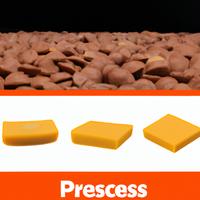
1 serving (40 grams) contains 190 calories, 3.0 grams of protein, 9.0 grams of fat, and 25.0 grams of carbohydrates.

Log this food in SnapCalorie

Nutrition Information
Calories |
760 | ||
|---|---|---|---|
% Daily Value* |
|||
| Total Fat | 36 g | 46% | |
| Saturated Fat | 28 g | 140% | |
| Polyunsaturated Fat | 0 g | ||
| Cholesterol | 0 mg | 0% | |
| Sodium | 420 mg | 18% | |
| Total Carbohydrates | 100 g | 36% | |
| Dietary Fiber | 4 g | 14% | |
| Sugars | 84 g | ||
| protein | 12 g | 24% | |
| Vitamin D | 0 mcg | 0% | |
| Calcium | 80 mg | 6% | |
| Iron | 2 mg | 11% | |
| Potassium | 320 mg | 6% | |
* Percent Daily Values are based on a 2,000 calorie diet. Your daily values may be higher or lower depending on your calorie needs.
Food Attributes
Source of Calories
About Reese pieces
Reese's Pieces are bite-sized candy pieces filled with a creamy peanut butter center and encased in a colorful, crunchy candy shell. Introduced by Hershey in 1978, these treats are American in origin and remain a popular snack and dessert topping. Reese's Pieces are made primarily from sugar, peanut butter, vegetable oil, milk solids, and artificial coloring. While they are a flavorful indulgence, their nutritional profile leans toward the indulgent side. High in sugar and fat, Reese's Pieces provide quick energy but lack significant vitamins, minerals, or fiber. They contain protein from the peanut butter filling, but this benefit is outweighed by the high calorie content and presence of processed ingredients. Moderation is key when enjoying these candies. They are best regarded as an occasional treat rather than a healthy snack option.



